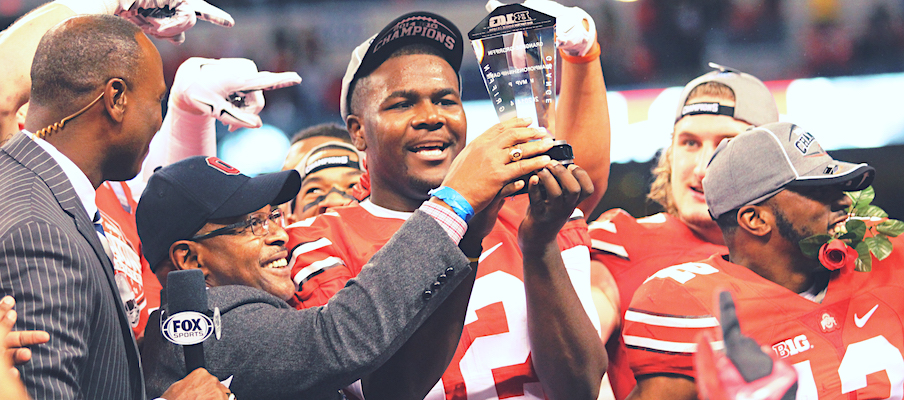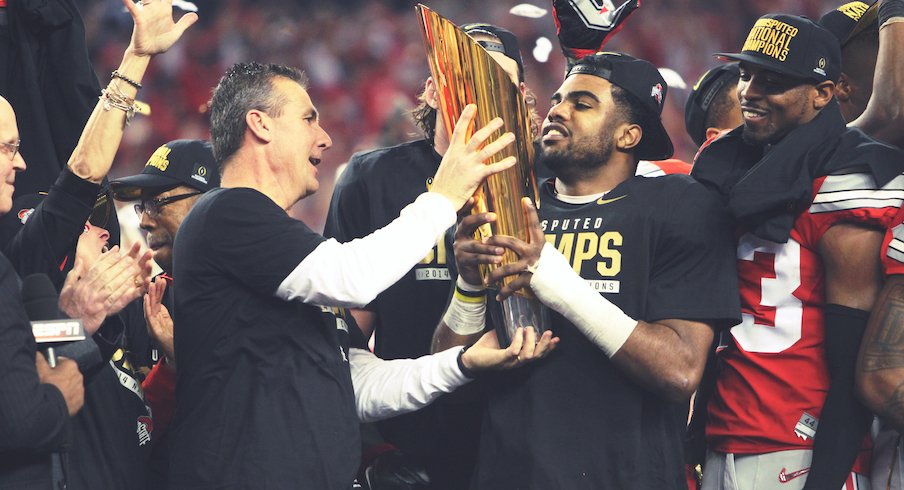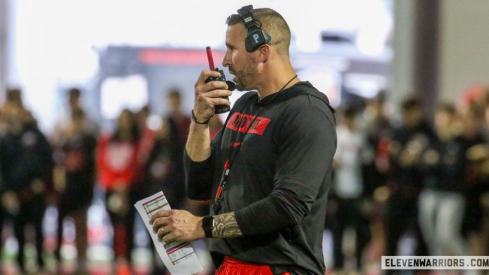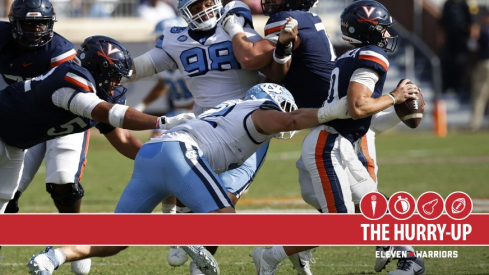Any Ohio State fan looking for a source of inspiration on how to overcome adversity and achieve success needs to look no further than the Buckeyes’ 2014 run to the national championship.
The Buckeyes lost their starting quarterback before the season, were upset at home by an unranked opponent in their second game of the year and lost their second starting quarterback in their final game of the regular season. Yet Ohio State overcame all of that to not only make the first-ever College Football Playoff, but win it, capping it off with a trio of victories over Wisconsin, Alabama and Oregon that might be the most iconic three-game stretch in OSU football history.
Given that, it was no surprise that Urban Meyer chose to share some of his memories from that season in an effort to inspire the state of Ohio’s high school class of 2020 as the keynote speaker for a televised commencement special that aired on 10TV and other local networks throughout the state on Saturday evening.
Meyer told the story of that season from the beginning, starting with the preseason practice in August when Braxton Miller tore the labrum in his right shoulder while throwing a pass. With the two-time reigning Big Ten Offensive Player of the Year out for the year before it even began, Meyer acknowledged he had major concerns about how the season would play out.
“As I held his hand, tears fell from his face, realization hit: Our best player was out,” Meyer said. “I remember calling my wife Shelley and telling her about Braxton’s injury, and we were headed for a very difficult season. I told her there was a chance we were looking at a 7-5 season, which in Columbus, Ohio, means a new coach will soon be in place. She was very positive, as she always is, and as a staff and team, we went back to work.”
At the time, Meyer wasn’t sure whether J.T. Barrett or Cardale Jones would be ready to get the job done. Barrett was coming off a torn ACL and had never played a collegiate snap. Jones, in Meyer’s words, “had issues in the past” – specifically academically and not taking football seriously enough – even though he was “always a good kid.”
When Ohio State suffered a 35-21 loss to Virginia Tech in its second game of the season, which Meyer described as “a terrible loss,” it looked like the Buckeyes could be headed for the bad season Meyer feared. But then, what Meyer described as a “very talented yet inexperienced team” started to evolve into an elite team, and Ohio State won its remaining 10 regular-season games.
“We began to see this young, talented team grow up,” Meyer said. “Mike Thomas became Mike Thomas. Zeke Elliott became Zeke. Joey Bosa became Joey Bosa. And our freshman quarterback (Barrett) broke Drew Brees’ Big Ten record for touchdowns.”
Early in the fourth quarter of Ohio State’s regular-season finale against Michigan, however, the Buckeyes’ championship hopes looked like they could be crushed again when “the unthinkable happened”: Barrett broke his ankle. Given that Ohio State had only a 28-21 lead over its rivals at the time, Meyer was worried about just being able to win that game without Barrett.
“Our quarterback, our leader, breaks his leg right in front of me. Same story. As I go out and hold his hand on the field, with tears rolling down his face, reality sets in: Our third-string quarterback, with issues, was now our starter,” Meyer said.
“As I put my hand on (Jones’) shoulder, I looked in his eyes, he looked like a young man getting ready to take a physics test where he never studied for it,” Meyer said. “However, my job as a coach is to encourage him. I looked him in the eye and said, ‘Cardale, I know you can do this,’ as I hit him on the rear and told him to go in and play the game. In my heart, I’m thinking, ‘There’s no way he can do this.’
“So Cardale Jones goes in, he just plays OK. Zeke Elliott breaks a fourth-down run for a touchdown; Darron Lee picks up a fumble, returns it for a touchdown. We beat our rivals at home.”
Going into the following week’s Big Ten Championship Game against Wisconsin, whose defense had been ranked No. 2 in the country at the time, Meyer said Ohio State intentionally devised a simple offensive game plan for Jones.
“We wanted Cardale to keep the ball outside on all pass plays,” Meyer said. “That means a freshman quarterback or a new quarterback making his first start, there’s a lot of anxiety, he’s very nervous. The adrenaline flows, you have a tendency to overstride, and the ball will go high down the middle of the field. That’s why we wanted to keep the ball out wide.”
On the third series of the game, Jones deviated from the game plan and threw a pass over the middle of the field that was nearly intercepted. But the way Jones held himself accountable for that mistake is what Meyer believes ultimately sparked what would happen next.
“I’m going to meet him out at the hashmark, I’m so upset. As he comes off the field, I hear Cardale Jones tell me, very loud because it’s a very loud environment, he goes, ‘Coach, that was my fault. That was my fault,’” Meyer said. “I stepped back. I looked at Cardale, in three years of coaching I’ve never heard him take responsibility or never take ownership of his actions. He made a mistake, and he let me know that. I thought, what a great opportunity to show your teammates, especially the most important people – the offensive line – let’s let them know that you just owned your mistake.
“So we went over to the offensive line, once again a very loud environment, Cardale Jones yells at the offensive line and says, ‘Guys, that was my fault.’ I watched our players look at Cardale Jones, their quarterback, that was also the first time they heard him take ownership of his performance. I saw instant respect. I saw love. I sat back and I thought to myself, ‘This is about to get very good.’ I knew we had a good team, but once you have the two qualities of love and ownership, that can become an elite team.”

Ohio State went on to win that game, 59-0, and the Buckeyes never looked back. They defeated Alabama in the College Football Playoff semifinals, 42-35, then earned a 42-20 win over Oregon in the national championship game for Ohio State’s first national title since 2002.
“The preparation was impeccable. Cardale Jones showed leadership, our team rallied around him, and that team got closer and closer,” Meyer said of the Buckeyes’ preparation for the College Football Playoff. “We don’t play well in the first half (against Alabama), couple turnovers, yet we’re dominating the line of scrimmage. The second half is all Buckeyes. We go on to beat a very talented Alabama team, and it’s onto the national championship game against Oregon at Jerry Jones’ stadium in Dallas, Texas. Cardale Jones plays fantastic, the team plays great, we played very well and we beat Oregon handily, and we are now the national champions of college football in the first-ever College Football Playoff.”
Jones’ transformation from unprepared third-string quarterback to championship-caliber leader made it all possible, and Meyer closed his retelling of that season by sharing an anecdote from the day after the national championship game.
“I head downstairs to go have breakfast as we prepare to leave and head back to Columbus, Ohio as national champions,” Meyer said. “I walk in the breakfast room, there's Cardale Jones sitting with a couple players. I head over and sit down. I just stare at Cardale, and I said, 'Cardale, what was that? What happened? Explain to me your transformation to be the leader you became to go down in history as a national champion quarterback.’ He looked me right in the eye, two tears started to roll down his cheeks, and he said, 'Coach, I finally figured out how to solve the mystery. The mystery is how do I put others ahead of self? I figured that out. I never wanted to let my brothers down, I could not let my brothers down, Braxton Miller and J.T. Barrett.’”


